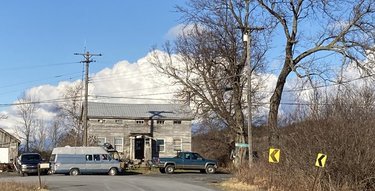Berne building department allegedly doing illegal work — again
BERNE — Berne’s code-enforcement officer, Kevin Flensted, resigned last month because the town was allowing building department officials to conduct work illegally, he wrote in his letter of resignation, even after he brought this to Supervisor Dennis Palow’s attention.
Palow told The Enterprise that Flensted’s claims were “bogus.” But a photo of the town’s work-management system backs up Flensted’s assertion.
Flensted was appointed code-enforcement officer in January, after having been hired last year as one of three building inspectors to replace James Bushnell. Bushnell had been the town’s sole building inspector, working with code-enforcement officer Chance Townsend. When Flensted was appointed code-enforcement officer this year, Townsend kept working for the department, as a building inspector.
In his resignation letter, which The Enterprise obtained through a Freedom of Information Law request, Flensted wrote that he “cannot sign off for work done by another inspector that was not qualified to do the work.” In his letter, he pointed out that the New York State Division of Codes “has strict requirements for certification and the work that can be performed.”
A photo of the town’s work-management system obtained by The Enterprise shows that building inspector Jon Heigel, who was one of the two men hired alongside Flensted last year, had performed inspections that fell outside of his purview.
Per state regulations, building inspectors are allowed to perform only “fire safety and/or property maintenance inspections of existing buildings and structures.” They are not allowed to conduct inspections that relate to the construction or modification of those things.
Heigel, when asked for comment over the phone, declined and hung up. He was unable to be reached again.
In addition to Heigel’s unauthorized inspections, it appears that Townsend, who had previously been at the center of scandal for holding his code-enforcement position while uncertified for almost all of 2020, was also uncertified this year.
His name does not show up on a state list that shows all currently active code-enforcement officers and building inspectors, and the New York State Department of State told The Enterprise that Townsend’s certification lapsed on Jan. 1 and remains inactive.
Townsend does not appear to be currently employed with the town, though The Enterprise was not able to confirm this or find out why in time for publication. He was working for the town as recently as April 13.
The town’s building department webpage currently shows Heigel as the only official working in the department aside from the department secretary, Cheryl Rudolph, who did not respond to Enterprise inquiries.
Rudolph had instead forwarded those inquiries to the town board, as Palow told Councilman Albert Thiem at the town board’s April 27 meeting. Palow was detailing for Thiem The Enterprise’s various attempts last month to collect basic information related to building department staffing.
Palow had told The Enterprise at the April 27 meeting that the allegation of Heigel doing work he was not allowed to was untrue.
According to emails obtained by The Enterprise, Flensted sought confirmation from the state about whether he was correct that building inspectors are not allowed to perform certain types of inspections and, once confirmation was received, alerted Palow, Townsend, and Heigel, along with various clerks within the town. This all occurred prior to the April 27 meeting.
“I informed the town supervisor, provided the standard, had the state provide the standard, but the supervisor feels he understands the standard better than I do,” Flensted told The Enterprise.
While the Department of State did not answer on the record whether Berne is under investigation for these violations, it did say in an email that investigations are “conducted by the Codes Division where there is evidence that the administration and enforcement of the codes does not meet the minimum requirements found in regulations (Part 1203 of Title 19).
“The Codes Division also investigates complaints against a Code Enforcement Official (CEO) or Building Safety Inspector (BSI), where there is evidence that an individual has materially failed to uphold their code enforcement duties,” the email went on. “A list of specific items which are considered as a material failure to uphold code enforcement duties are found in Part 1208 of Title 19.”
Among the items listed as a violation is a code-enforcement officer performing “any code enforcement activity at a time when his or her certification is inactive or suspended.”
If an official is found guilty of not upholding his responsibilities, he may have his license suspended or revoked, the regulation says.
What’s next?
It’s unclear how the town will proceed without a certified code-enforcement officer for the time being, and how it will reconcile jobs that were allegedly performed outside of regulatory bounds.
Town Clerk Kristin De Oliveira acknowledged that she is in receipt of Enterprise Freedom of Information Law requests for all inspection reports and building permits filed this year between Jan. 1 and April 28.
In an email to Flensted, a code compliance specialist with the Department of State wrote that those permits should be noted as erroneous, but that a certified code-enforcement officer can retroactively approve the work.
“In this case it may be good to have your Supervisor issue the certificate of occupancy to demonstrate that extra oversight was provided due to the circumstances you have described,” the specialist wrote. “The Supervisor would do that based on your reports as the CEO, which must at least affirm substantial compliance with the approved plans and with the Uniform Code.
“The permit file should contain a note that it was issued in error due to the fact that it wasn’t predicated on plans that have been approved by the town’s CEO,” the specialist continued. “But that note should also include information about how the error has been corrected by obtaining from you the required approval from the CEO for the plans. Of course that means you as the CEO would actually perform a review of the plans to verify their compliance with the Uniform Code. The note in the permit file should then conclude that the error has been remedied and that the permit is therefore valid.”



